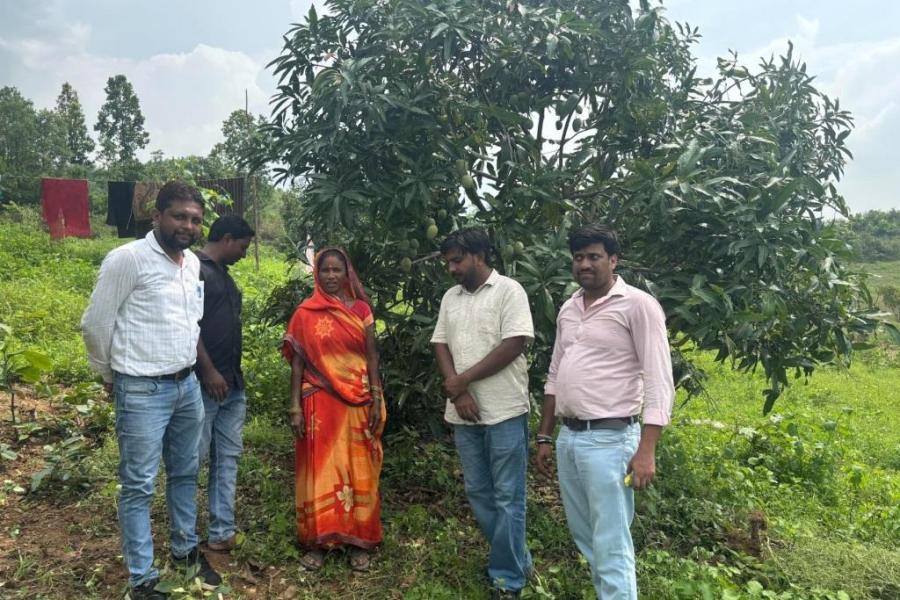Sameer L. Kanodia is the Managing Director and CEO of Lumina Datamatics Limited, a leading service provider for global publishers and eCommerce companies. With over 20 years of experience in the company, Sameer's  visionary leadership and extensive network has driven growth and success. He oversees operations, strategic initiatives, mergers and acquisitions, and go-to-market strategies for the company. Under his guidance, Lumina Datamatics has become a benchmark in publishing services and online retail solutions. Known for his ability to turn challenges into opportunities, he inspires excellence within the company and is recognized for his leadership skills.
visionary leadership and extensive network has driven growth and success. He oversees operations, strategic initiatives, mergers and acquisitions, and go-to-market strategies for the company. Under his guidance, Lumina Datamatics has become a benchmark in publishing services and online retail solutions. Known for his ability to turn challenges into opportunities, he inspires excellence within the company and is recognized for his leadership skills.
Sameer's dynamic leadership extends beyond Lumina Datamatics, as he actively contributes to various educational and industry organizations, sharing his insights and expertise through board memberships and committee engagements. He actively serves on the boards of prestigious organizations such as Bryant University, USA, where he held the position of Trustee for ten years until 2017. He is also a distinguished member of the Association of Governing Board of Universities and Colleges, USA, since 2012. Additionally, Sameer plays a vital role in the IT Committee at the IMC Chamber of Commerce and Industry, where he has been actively engaged for three years. Through his dynamic leadership and involvement in various educational and industry organizations, Sameer consistently shares his insights and expertise, shaping the direction of these esteemed institutions while inspiring excellence within his company.
In this thought provoking article, Sameer delves into the transformative power of the Data for Good movement. With a profound understanding of the potential of data, analytics, and technology, he explores how these elements can be harnessed to address complex social challenges. From data-driven decision-making and evidence-based strategies to measuring impact and ensuring data security, he unravels the key pillars of this movement. He also sheds light on the importance of collaboration and data sharing among diverse stakeholders, emphasizing their role in driving systemic change. Drawing upon real-world examples, he illustrates how companies are utilizing data for social impact, creating positive change in sectors like education, healthcare, and disaster recovery. Prepare yourself for an insightful journey as Sameer shares his vision for a future where data becomes a catalyst for transformative social change.
(Article begins)
In our increasingly data-driven world, organizations recognize the power of data, analytics, and technology to derive positive social impact. That’s where Data for Good comes in. It's a movement that leverages the expertise of data professionals to manage some of the world's biggest challenges.
With advancements in technology, there has been an explosion of available data, presenting a unique opportunity to address pressing social issues and make a more meaningful difference in people's lives. By harnessing data expertise, organizations can inform decision-making processes, develop evidence-based strategies, and measure the impact of their initiatives more effectively.
This article will explore how data, analytics, and technology are revolutionizing and causing social change.
● Uncovering Insights for Informed Decision-Making: One of the primary benefits of utilizing data and analytics for social impact is the ability to uncover insights that inform decision-making processes. By analyzing vast amounts of data, organizations can identify patterns, trends, and correlations that may go unnoticed. For instance, examining demographic data can help identify underserved communities or vulnerable populations needing targeted interventions. This data-driven approach enables organizations to allocate resources effectively and prioritize initiatives based on objective evidence.
Additionally, predictive analytics can help anticipate future social challenges and devise proactive solutions. By leveraging historical data and advanced algorithms, organizations can forecast potential issues and design preventive measures to address them. This saves resources and empowers organizations to mitigate social problems before they escalate.
● Implementing Evidence-Based Strategies: Data-driven insights are a foundation for evidence-based strategies to drive social change. By analyzing the impact of existing programs and interventions, organizations can identify successful approaches and replicate them on a larger scale. This enables allocating resources to initiatives with proven effectiveness, maximizing their potential for creating a positive impact.
Moreover, data analysis facilitates iterative learning and adaptation. As organizations collect data on the outcomes of their initiatives, they can continuously evaluate their effectiveness and make necessary adjustments. This iterative process allows for constant improvement and optimization of strategies to better address social issues over time.
● Measuring Impact and Accountability: Accurately measuring the impact of social initiatives has long been a challenge. However, data, analytics, and technology are powerful tools to overcome this obstacle. By employing data-driven metrics and evaluation frameworks, organizations can assess the effectiveness of their programs and interventions more objectively.
Technology is crucial in collecting, processing, and analyzing data to measure impact. From sophisticated data management systems to machine learning algorithms, technology streamlines the process of data collection and analysis, enabling organizations to derive meaningful insights efficiently. These insights, in turn, would allow organizations to communicate the impact of their work transparently and be accountable to stakeholders, including funders, beneficiaries, and the public.
● Collaboration and Data Sharing: Using data, analytics, and technology for social impact is not limited to individual organizations. Collaborative efforts and data sharing among various stakeholders, including governments, nonprofits, academia, and private sector entities are essential for driving systemic change. By combining resources, expertise, and data, these collaborations can tackle complex social issues that require interdisciplinary approaches. Data sharing also promotes collective learning and empowers organizations to leverage insights from different sectors, enabling more comprehensive solutions and maximizing positive social impact.
● Leveraging Data Expertise: In an era of unprecedented data availability and technological advancements, leveraging data, analytics, and technology for positive social impact is becoming increasingly vital. By harnessing data expertise, organizations can make informed decisions, implement evidence-based strategies, and measure the impact of their initiatives more effectively. Data-driven insights empower organizations to address pressing social issues, improve people's lives, and drive meaningful change. As we progress, we must continue fostering collaborations and promoting data sharing to unlock the full potential of data and technology.
Initiatives to Create Social Impact by Recognizing the Power of Data
Today, many companies recognize the power of data and technology to bring about a social impact. For instance, one of the largest service providers to global publishers and eCommerce companies recently partnered with Space Kidz India to launch a satellite into outer space. The program involved 750 teenage girls from 75 rural schools. Through this initiative, the company aimed to empower girls with the power of education and bring a social impact. The satellite launch initiative helped young girls from impoverished backgrounds with new opportunities that will enable them to explore different skill sets and, perhaps, even target careers in Space.
Additionally, the company has hosted the beneficiaries of one of its corporate social responsibility programs in collaboration with Chennai’s Aaruthal Foundation.
The company felicitated its skill development program participants by awarding them certificates of completion. This CSR initiative sought to train young women from economically underprivileged families as General Duty Assistants to help support nurses at healthcare institutions and other patients needing primary care. The two-month program helps these women find sustainable employment.
These are a few examples of collaborative efforts that bring companies, data professionals, and other experts to work on projects that positively affect our society.
Prioritizing Data Security
At present, the Data for Good movement is gaining momentum across the world. Renowned organizations are leading the way by bringing together data professionals and social organizations to work together on projects that positively impact our society. Therefore, it is essential to prioritize data security, as it can give organizations a competitive edge.
Moreover, businesses can demonstrate robust data security measures and differentiate themselves from competitors. This initiative is sure to attract potential customers who value data security practices. Companies with powerful data security measures are better equipped to respond, recover, and mitigate damage quickly.
One of the major challenges is ensuring that data is used ethically, and that privacy is protected. Hence, data professionals must be cautious of the ethical factors of their projects and verify that the data is used in an unbiased and transparent manner.
The Conclusion
The Data for Good movement has the potential to leverage the expertise of data professionals to drive a positive impact on our society. It can bring significant changes, especially in education, healthcare, and disaster recovery management. As the Data for Good movement thrives, we expect many new projects that use data for social good in the upcoming years.




 visionary leadership and extensive network has driven growth and success. He oversees operations, strategic initiatives, mergers and acquisitions, and go-to-market strategies for the company. Under his guidance, Lumina Datamatics has become a benchmark in publishing services and online retail solutions. Known for his ability to turn challenges into opportunities, he inspires excellence within the company and is recognized for his leadership skills.
visionary leadership and extensive network has driven growth and success. He oversees operations, strategic initiatives, mergers and acquisitions, and go-to-market strategies for the company. Under his guidance, Lumina Datamatics has become a benchmark in publishing services and online retail solutions. Known for his ability to turn challenges into opportunities, he inspires excellence within the company and is recognized for his leadership skills. 
.jpg)











.jpg)



